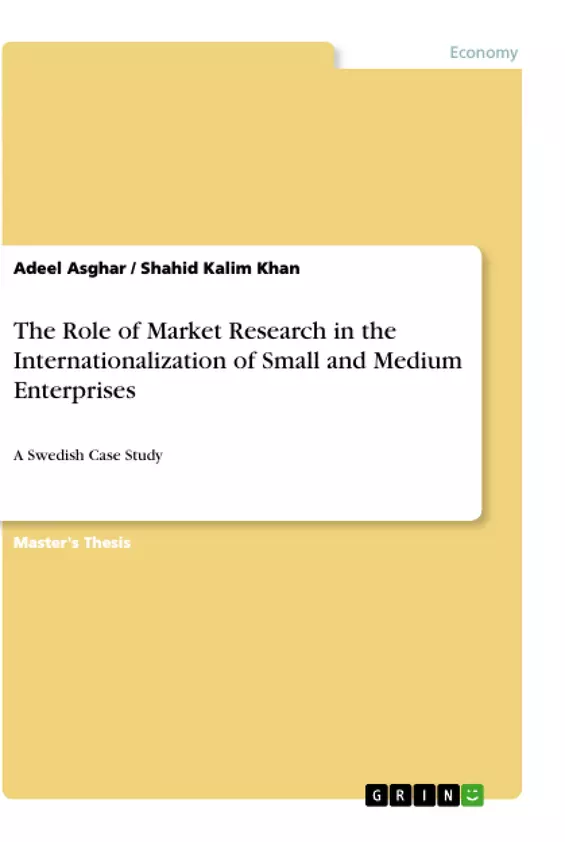The topic of this dissertation comes from these two areas: internationalization of small and medium enterprises (SMEs) and international entrepreneurship. When looking into SMEs internationalization research, there is lack of material about pre-internationalization stage of SMEs. It is also very critical that firms should have theoretical guidelines to follow in early internationalization stage when they have no or very little international experience.
SMEs are well known for their innovative and risk taking approach. This study aims at providing them with a strategic framework or method to analyze the marketability of their products or services and exploit internationalization opportunities. It also focuses on helping them in reducing their risks linked with cross border business opportunities. This research is performed through case study method. A new conceptual model has been developed by integrating relevant standard approaches within the field of research. This model has been further explained by implementing it on case company.
Internationalization of SMEs in general has become a very famous topic in the world. This is the area which is developing further at present. Plenty of research has been performed from different perspectives and angles. International Entrepreneurship is an emerging area when it is yet struggling for standard definition. International entrepreneurship theory and SMEs are very much connected areas. While making a study related to internationalization of SMEs, we cannot neglect the importance of entrepreneurs, which is widely recognized as the main variables in SMEs' internationalization.
Developing theoretical and conceptual model by integrating different existing theories is very usual in SMEs' internationalization research area. This may be due the reason that there is lack of standard theories or approaches in this area so there is an absolute need for such efforts. Motivated by similar drive authors aimed to create customized theoretical framework for analysis with the help of different standard approaches in the field.
Inhaltsverzeichnis (Table of Contents)
- Introduction
- Theme of our Study
- Company and Product Introduction
- Objective and Purpose
- Strategic Question/Problem Statement
- Research Questions
- Target Group
- Delimitations
- Methodology
- Topic Selection
- Research Approach
- Data Collection
- Purpose of Primary Data Collection
- Primary Data Collection Method
- Semi Structured Interviews for market survey
- Non Structured Interview with Company Owner
- Analysis Method
- Statistical Analysis
- Literature Review
- Presentation of Findings/Results
- Critical Literature Review
- Uppsala internationalization model (U-model)
- International Entrepreneurship Theory
- Marketing Mix
- Theories supplementing Marketing Mix
- Skimming versus Penetration
- MEC approach
- The Kano Model of Customer Satisfaction
- Network Theory
- Theoretical/Conceptual Framework
- International Entrepreneurship Theory
- The role of marketing research in internationalization
- The strategic framework for SMEs to exploit international opportunities
- The application of marketing research in the early stages of internationalization
- The impact of marketing research on the risk profile of internationalizing SMEs
- The development of theoretical models for innovative SME internationalization
Zielsetzung und Themenschwerpunkte (Objectives and Key Themes)
This study focuses on providing a strategic framework for innovative SMEs to analyze the marketability of their products and services, enabling them to exploit international opportunities and reduce the risks associated with cross-border business ventures. The study seeks to understand how marketing research can contribute to the early internationalization process of SMEs.
Zusammenfassung der Kapitel (Chapter Summaries)
The Introduction chapter sets the stage for the study, outlining the research theme, company and product details, objectives, research questions, target group, and delimitations. Chapter 2 delves into the research methodology, exploring topic selection, research approach, data collection methods, analysis techniques, and the literature review. Chapter 3 provides a critical review of existing literature relevant to the study, including the Uppsala model, international entrepreneurship theory, and marketing mix principles. It also examines theories supplementing the marketing mix, such as skimming versus penetration pricing, the MEC approach, the Kano model of customer satisfaction, and network theory. Chapter 4 outlines the theoretical and conceptual framework of the study, focusing on the International Entrepreneurship Theory. This framework serves as a foundation for further analysis and exploration of the research question.
Schlüsselwörter (Keywords)
The primary focus of this study is on the role of marketing research in supporting innovative SMEs in their pursuit of internationalization opportunities. The study explores key concepts like SME internationalization, marketing research, international entrepreneurship, theoretical models for SME internationalization, and risk management in the context of international business expansion.
Frequently Asked Questions
Why is market research crucial for SMEs during internationalization?
Market research helps SMEs analyze the marketability of their products, identify opportunities, and significantly reduce risks linked with cross-border business.
What is the "Uppsala Internationalization Model"?
It is a theory suggesting that firms increase their international involvement in small, incremental steps as they gain more knowledge about foreign markets.
How does the "Network Theory" apply to SME expansion?
Network theory emphasizes that internationalization is often driven by the relationships and connections an entrepreneur has with partners, suppliers, or customers abroad.
What are the challenges for SMEs in the pre-internationalization stage?
SMEs often lack theoretical guidelines, international experience, and resources to conduct extensive market surveys, making a strategic framework essential.
What role do entrepreneurs play in SME internationalization?
Entrepreneurs are recognized as the main variable; their innovative mindset and risk-taking approach are key drivers for entering global markets.
- Arbeit zitieren
- Adeel Asghar (Autor:in), Shahid Kalim Khan (Autor:in), 2009, The Role of Market Research in the Internationalization of Small and Medium Enterprises, München, GRIN Verlag, https://www.grin.com/document/499514



